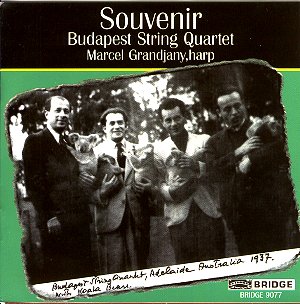Souvenir is the word – miscellany is another
– but whatever you call it this is an unashamedly engaging collection
of repertoire not now associated with the heavyweight Budapest Quartet.
The commercial discography however only tells, at best, a partial story
reflecting the needs and dictates of a record company and seldom exploring
the more disparate nature of the artists’ work. Because from their earliest
days they had played a wide and intriguing number of pieces, some tailor
made for the country of their concert tours, some
played a few times only, but all of which somewhat belie their subsequent
reputation as Beethovenian Olympians. So we know from another source
that quartets were played by Elgar, Vaughan Williams, Bridge, Křenek
(No 7), Martinů 6, Prokofiev (1 and 2), Shostakovich Op
49, Tansman (No 5), Villa-Lobos (2,6,17), Wellesz Op 67, Reger No 4,
Rieti (2 and 3), Kreisler and Roussel Op 45. We also know that they
collaborated in performances of Vaughan Williams’ On Wenlock Edge
as well, probably, as Warlock’s The Curlew (a reference to the
performance of a Warlock Quartet leads one to think so anyway). And
then there was the amount of American music they played – notably Piston,
Porter, Griffes and Mason but many others as well. In both choice of
repertoire and inclination they seem to have taken over the role the
Flonzaley Quartet occupied with regard to the promotion of native music
in America.
The pieces on this Bridge CD reflect some of these
facets. The Handel Concerto with elite French harpist, the saturnine
Marcel Grandjany, is best known as the Op 4 No 6 Organ Concerto and
is presented here in a dulcet arrangement for harp and string quartet.
One doesn’t need to be an active adherent of vintage performance practice
to enjoy it. It’s affectionate and lyrical with an extensive cadenza
that shows off Grandjany’s unflappable technique. Meatier is Daniel
Gregory Mason’s String Quartet on Negro Themes. This had an outing on
Victor 78s courtesy of those indefatigable artists the Coolidge Quartet
and more recently a Vox LP devoted to American chamber music included
it, played by the Kohon Quartet, alongside works by Foote, Henry Hadley,
Chadwick, Loeffler and Griffes and others. It’s an eclectic, sonorous,
rhythmically alert work dedicated to the Flonzaley Quartet with a first
movement laden with vigour and spiced with impressionistic devices and
impish attacks – not dissimilar in fact from the kind of works written
by the two British Josephs – Speaight and Holbrooke. The central movement,
a combined slow movement and scherzo, takes Deep River as its theme
and subjects it to light transformative procedures ending in a return
to the tempo primo and a kind of misty security. Occasionally the recording
is itself a little murky – some of the inner part writing especially
is inclined to be obscured as a result – but Mason’s use of spirituals
is affectionate and rhythmically supple with touches of vernacular used
to good effect.
Grandjany returns for Debussy’s luscious Danse sacrée
et danse profane. The 1904 test piece receives a glittering evocation
of its Dorian and Lydian modes; and Grandjany’s elfin delicacy is a
source of delight. Griffes’ Two Sketches were published posthumously
after his untimely death in his mid thirties. Edited by Adolfo Betti,
first violinist of the Flonzaley, the first sketch is a lament with
high see saw string figuration and keening lower strings based on the
Farewell song of the Chippewa Indians whereas the second is more a moto
perpetuo affair, energetic and exciting. Two other works round out the
disc – the slow movement of Dvorák’s Op 96 – the only work here
they recorded commercially – and a quartet warm up number, never performed
in concert, of a naughty-but-nice arrangement of the tune Dinah; enough
to say that it opens with a sonorous quotation from a Schubert Violin
Sonatina, chucks in Silver Threads Among The Gold and swings mightily
with wicked finesse.
Jonathan Woolf


